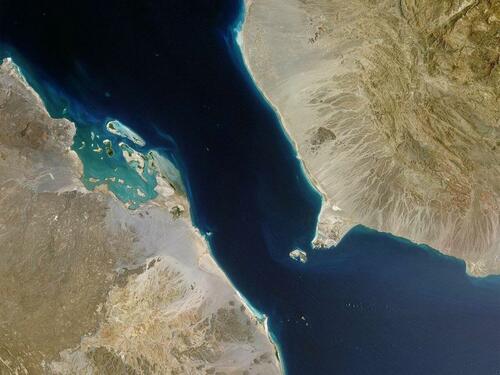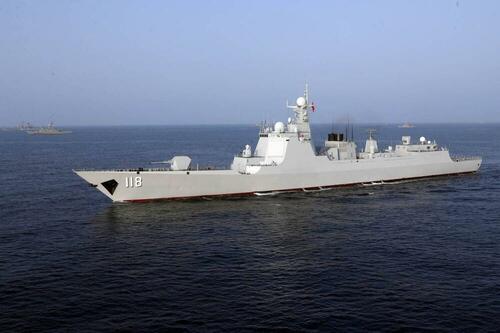
On Thursday Houthi chief Abdul-Malik al-Houthi declared that "we are now in direct confrontation with the US and UK" in the Red Sea, following the overnight US coalition airstrikes on Yemen, which constitute the fourth round of counter-Houthi attacks.
The Houthis this week have said they will attack all Israeli and US targets in response to the massacre of Palestinians happening in the Gaza Strip. "Anyone attempting to hinder us from doing so will fail," a Houthi official said Monday.
As we noted earlier, the Houthis latest attack on Red Sea commercial vessels came on the very day that the Biden administration relisted the group as a global terror organization. Thus it's clear that with each escalatory move of Washington, the Houthis express their defiance, and have only become more committed to wreaking havoc on global shipping in the vital Red Sea waterway.
Initially, the Houthis declared that either Israeli vessels or ships headed to Israeli ports would be targeted, but the scope of their targeting has expanded. "The ship doesn’t necessarily have to be heading to Israel for us to target it, it is enough for it to be American," Nasruddin Amer, a Houthi spokesman, told Al Jazeera at the start of this week.
Maritime monitoring source Tanker Trackers has observed that vessels have increasingly opted for an interesting security measure: "There are now close to 50 vessels worldwide which broadcast AIS messages stating that they have nothing to do with Israel (some; even USA), including one which won't even pass through the Red Sea area at all as it is heading to Malaysia from the Atlantic Ocean."
Meanwhile, Al Jazeera is reporting the following development Thursday:
Iranian Navy Commander: The Alborz destroyer is in the Red Sea to escort Iranian commercial ships and oil tankers

There have been recent unconfirmed reports that Iranian or Hezbollah operatives could be on the ground in Yemen giving assistance to the Houthis. Recent Wall Street Journal analysis highlighted this as follows:
Members of Iran’s Islamic Revolutionary Guard Corps and their Lebanese ally Hezbollah have been assisting Houthi attacks on commercial ships, according to people familiar with the Yemeni group. A spokesperson for the Houthis said in December that the group didn’t need to rely on Iran for help in its attacks.
The attacks are a concern for Tehran’s government, said a senior Iranian official.
“The Houthis are more emboldened with every hit,” said the official, who was part of the team that negotiated a now-abandoned nuclear deal with the U.S. and other nations in 2015.
The official continued, "That’s a problem because it further raises tensions between Iran and America, which neither want a direct confrontation." Unpredictability grows, as "They could strike an American warship, a China cargo vessel or a Russia-linked tanker. Then all hell can break loose."
Photos show damage to the $GNK bulk carrier Genco Picardy after it was hit by a Houthi attack drone yesterday in the Gulf of Aden.
— Mike Schuler (@MikeSchuler) January 18, 2024
Images released by the Indian Navy of course pic.twitter.com/MQPjwqJfxs
But when it comes to the crisis in the Red Sea, Russia has been relatively quiet, and appears to be staying on the sidelines. However, the Kremlin has condemned escalation via US coalition airstrikes.
"A large-scale military escalation in the Red Sea region could strike out the positive trends that have emerged recently in the Yemeni settlement process, as well as provoke a destabilization of the situation throughout the Middle East," foreign ministry spokeswoman Maria Zakharova warned last Friday.
* * *
Below is a relevant note from Rabobank...
Davos, and ECB President Lagarde, also mentioned Red Sea inflation risks. There, the US has redesignated the Houthis as global terrorists - with a 30-day notice period(!) and massive sanctions carve-outs. The Houthis, apparently as deft at comedy as at disrupting the global economy, released a statement saying the US move “would not affect their operations.”
Indeed, they have since hit another ship, and may be shifting their mobile missile launchers to avoid airstrikes and target the Gulf of Aden as well as the Bab El-Mandeb. That makes the maritime area vulnerable to attack even further beyond the protective capabilities of Operation Prosperity Guardian. So what is to be done as the ‘US Empire’ crumbles and the global maritime trading system goes back to a 19th century world of piracy, national navies having to protect trade, and no Suez or Panama Canals? Davos is short of answers.
On Thursday Houthi chief Abdul-Malik al-Houthi declared that “we are now in direct confrontation with the US and UK” in the Red Sea, following the overnight US coalition airstrikes on Yemen, which constitute the fourth round of counter-Houthi attacks.
The Houthis this week have said they will attack all Israeli and US targets in response to the massacre of Palestinians happening in the Gaza Strip. “Anyone attempting to hinder us from doing so will fail,” a Houthi official said Monday.
As we noted earlier, the Houthis latest attack on Red Sea commercial vessels came on the very day that the Biden administration relisted the group as a global terror organization. Thus it’s clear that with each escalatory move of Washington, the Houthis express their defiance, and have only become more committed to wreaking havoc on global shipping in the vital Red Sea waterway.
Initially, the Houthis declared that either Israeli vessels or ships headed to Israeli ports would be targeted, but the scope of their targeting has expanded. “The ship doesn’t necessarily have to be heading to Israel for us to target it, it is enough for it to be American,” Nasruddin Amer, a Houthi spokesman, told Al Jazeera at the start of this week.
Maritime monitoring source Tanker Trackers has observed that vessels have increasingly opted for an interesting security measure: “There are now close to 50 vessels worldwide which broadcast AIS messages stating that they have nothing to do with Israel (some; even USA), including one which won’t even pass through the Red Sea area at all as it is heading to Malaysia from the Atlantic Ocean.”
Meanwhile, Al Jazeera is reporting the following development Thursday:
Iranian Navy Commander: The Alborz destroyer is in the Red Sea to escort Iranian commercial ships and oil tankers

There have been recent unconfirmed reports that Iranian or Hezbollah operatives could be on the ground in Yemen giving assistance to the Houthis. Recent Wall Street Journal analysis highlighted this as follows:
Members of Iran’s Islamic Revolutionary Guard Corps and their Lebanese ally Hezbollah have been assisting Houthi attacks on commercial ships, according to people familiar with the Yemeni group. A spokesperson for the Houthis said in December that the group didn’t need to rely on Iran for help in its attacks.
The attacks are a concern for Tehran’s government, said a senior Iranian official.
“The Houthis are more emboldened with every hit,” said the official, who was part of the team that negotiated a now-abandoned nuclear deal with the U.S. and other nations in 2015.
The official continued, “That’s a problem because it further raises tensions between Iran and America, which neither want a direct confrontation.” Unpredictability grows, as “They could strike an American warship, a China cargo vessel or a Russia-linked tanker. Then all hell can break loose.”
Photos show damage to the $GNK bulk carrier Genco Picardy after it was hit by a Houthi attack drone yesterday in the Gulf of Aden.
Images released by the Indian Navy of course pic.twitter.com/MQPjwqJfxs
— Mike Schuler (@MikeSchuler) January 18, 2024
But when it comes to the crisis in the Red Sea, Russia has been relatively quiet, and appears to be staying on the sidelines. However, the Kremlin has condemned escalation via US coalition airstrikes.
“A large-scale military escalation in the Red Sea region could strike out the positive trends that have emerged recently in the Yemeni settlement process, as well as provoke a destabilization of the situation throughout the Middle East,” foreign ministry spokeswoman Maria Zakharova warned last Friday.
* * *
Below is a relevant note from Rabobank…
Davos, and ECB President Lagarde, also mentioned Red Sea inflation risks. There, the US has redesignated the Houthis as global terrorists – with a 30-day notice period(!) and massive sanctions carve-outs. The Houthis, apparently as deft at comedy as at disrupting the global economy, released a statement saying the US move “would not affect their operations.”
Indeed, they have since hit another ship, and may be shifting their mobile missile launchers to avoid airstrikes and target the Gulf of Aden as well as the Bab El-Mandeb. That makes the maritime area vulnerable to attack even further beyond the protective capabilities of Operation Prosperity Guardian. So what is to be done as the ‘US Empire’ crumbles and the global maritime trading system goes back to a 19th century world of piracy, national navies having to protect trade, and no Suez or Panama Canals? Davos is short of answers.
Loading…






